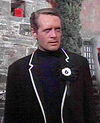In classic 60s TV show 'The Prisoner', a character known only as Number Six is subjected to identity theft, hypnosis, mind control, dream manipulation and hallucinogenic drug experiences in order to extract the reasons behind his resignation as a government agent. His captors never obtain the truth, and in fact Number Six spends the entire series interrogating them about who they actually work for, though ultimately, he is also unsuccessful.
The Prisoner then concerns the quest for knowledge and information, and whether we can ever truly be satisfied with the answers that we get. With the exception of hallucinogenic drugs (as far as I'm aware), this makes it not dissimilar to PR.
We PRs spend much of our daily lives trying to find out about forthcoming product launches, the status of customer deals, internal changes, whether or not our client is about to be swallowed by Google or go bankrupt. And while we can obtain many of the parts, it's often impossible to obtain the whole. Either the information can only be found via a chain of thirty different people, or it exists only in the CEO’s head and the CEO hasn't made up their mind yet, or it doesn't actually exist at all.
Similarly, clients are often mystified as to why they've been painted in a bad light in an editorial column, why a journalist has met with them on a number of separate occasions, but still hasn't written anything, or why a profile piece in the FT hasn't generated the number of sales leads expected. And while we can usually hazard a pretty good guess, it doesn’t necessarily mean that the client will accept what they’re being told.
Of course, sometimes, there just isn’t a logical explanation - and failure to acknowledge the role that chance, circumstance and the unknown play in everyday PR activities can easily lead to a misfiring PR campaign. A client or PR who tries to ruthlessly dictate every facet of the campaign – "we'll stick to our six month timeline by hook or by crook" – with no scope for flexibility or change, hasn’t recognised that some factors, some pieces of information, will always remain outside of their control.
Number Six may never find out who is in charge, but he uses the snippets obtained to help him achieve his ultimate goal and escape. Similarly, PRs need to engage with businesses to understand their internal processes and formulate better ways of improving information flow, in order to achieve more effective communications with their audiences.
Furthermore, many PR companies - recognising that campaign evaluation based around quantity of namechecks is hugely limited - have rightly started formulating more scientific approaches for assessing the effectiveness of their clients' campaigns, as well as engaging more with the journalist community to better understand their wants and needs.
By accepting that we can never hold all the cards, and channelling the information we do have as efficiently as possible, PRs will greatly improve their relationships, reputations, and the chances of receiving strategic, quality coverage, without the need to resort to hypnosis or mind control.

Comments